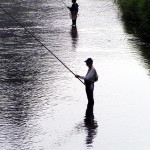Articles tagged with ‘Teachers’ Page 2
-
Learning how to fish: Or, why it’s essential to know how to learn
Learning how to learn Chinese is an essential skill for any student, regardless if you study on your own or in a course. This article explains why going to class is not enough.
Read → -
About fossilisation and improving your Chinese pronunciation
It’s a fact that most foreign adults don’t acquire native like pronunciation in Chinese, but what’s the reason? In most debates at this point, someone will throw in the word “fossilisation”, as if that actually explained anything. This article is about why the concept of fossilisation is bunk and how we should think about adult pronunciation instead.
Read → -
The question you have to ask about your Chinese teacher or course
The most important question you should ask yourself about your current teacher or course is what you won’t learn. Since this isn’t something most teachers and schools like to talk about, it’s typically something you need to figure out on your own. This article discusses this question from various angles, highlighting the importance of being aware of what you need to study on your own.
Read → -
You shouldn’t walk the road to Chinese fluency alone
The road to Chinese mastery is long, but fortunately, you don’t have to walk it alone. This article describes four different kinds of people and how they will help you to master Chinese: the local, the traveller, the supporter and the guide. They all have their different strengths and you should learn what they are in order to make the journey as smooth as possible.
Read → -
The importance of counting what counts when learning Chinese
The way in which we count proficiency or progress have a huge impact on how we study. This is relevant for teachers and students alike. Teachers should strive towards counting (grading) what counts (is important); students should do likewise when assessing themselves and also be aware of what kind of consequences counting the wrong things can have.
Read → -
What native speakers know and what they don’t
I’ve come a cross enough examples of people overstating the importance of being a native speaker to lead me to think that it’s a general trend and not an isolated phenomenon. This attitude is so bizarre it left me baffled the first few times, but I’ve come across this so often that it can no longer be dismissed as coincidence: people really seem to think that native speakers know everything, although it’s obvious that they don’t. This also means that most native speakers over-estimate their own language ability.
Read → -
The virtues of learning Chinese through language exchange
A language exchange is simply a relationship between two people who want to learn each other’s language. It is useful because it allows you to focus fully on language without having to worry that your ordinary friends think it’s taxing to be with you because you always ask so many questions.
Read →






